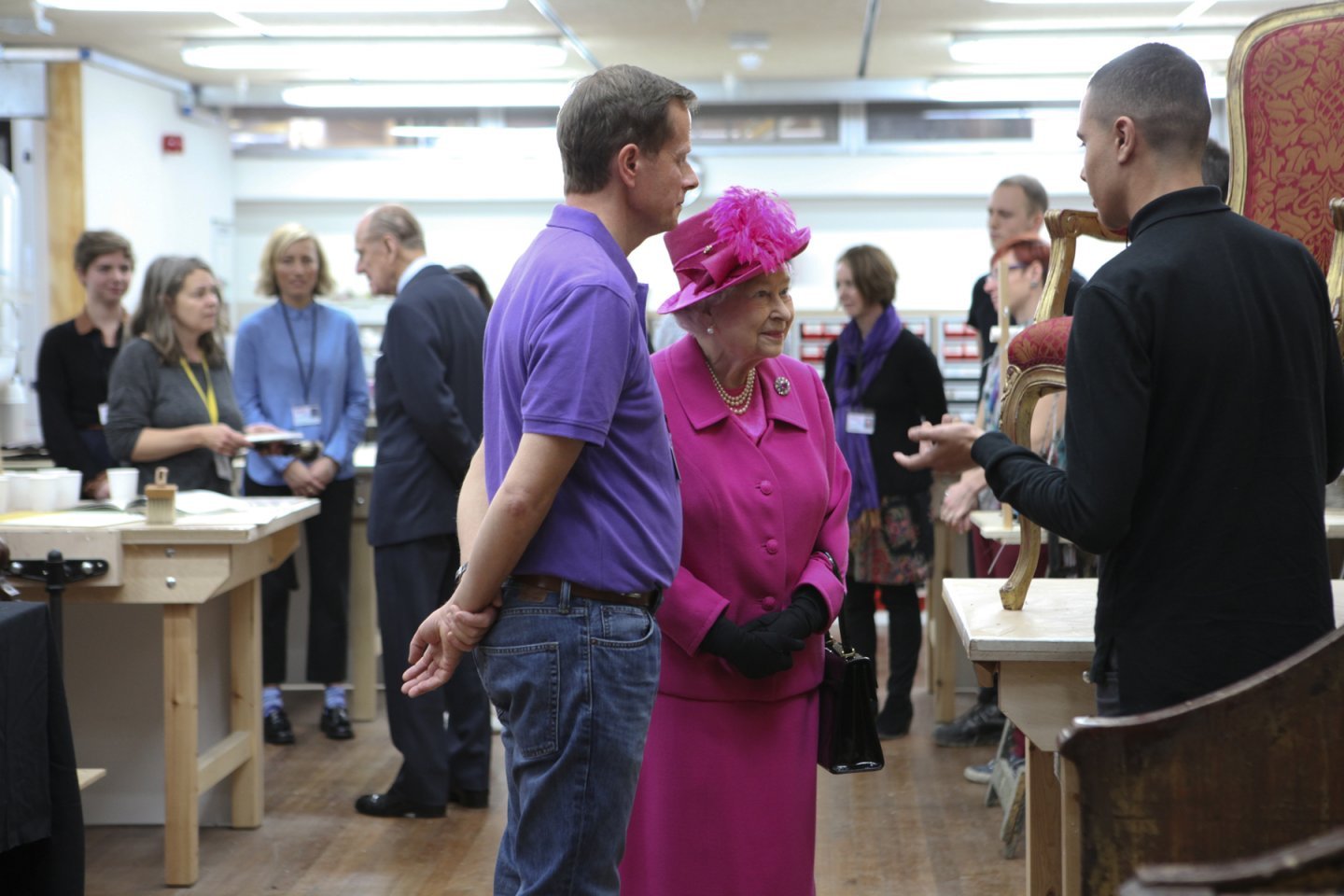
Lewis Boulcher, a prop-making apprentice, meets HM The Queen on her visit to mark The National Theatre’s 50th anniversary in 2013
If at first you don’t succeed…
The National Theatre isn’t shy about re-approaching a foundation that has previously turned it down. Emily Horn and Bryony Mills explain why.
Last year The National Theatre staged 33 productions on London’s South Bank, played in the West End and internationally, toured to 37 towns and cities around the UK, and, through National Theatre Live, broadcast performances to 1,500 cinemas in over 40 countries. Combined with our learning programme and our partnerships with theatres in the UK and abroad this makes us one of the most active theatres in the world. This has happened against a backdrop of sharply declining government funding that presents a real challenge to our vision. By 2017/18 our funding from Arts Council England (ACE) will have decreased by over 32% in real terms since 2010/11. Despite this, we remain restlessly ambitious and trusts and foundations play a vital role in enabling us to find and develop the next generation of directors, designers and writers, to extend our learning programme even more widely across the UK, to keep ticket prices accessible and to make the very best theatre and share it with as many people as possible.
The theatre’s ability to innovate in all areas of its activity often provides us with opportunities to attract new funders and re-approach those which have previously declined our applications
Although we sit within the wider development department, only the two of us focus on trust fundraising and as such, we have to streamline our approaches carefully. One of the biggest challenges, and also the biggest strengths of working here, is the ever growing and evolving range of projects that require funding. Although this can sometimes feel like a case of too much choice when approaching funders, the theatre’s ability to innovate in all areas of its activity often provides us with opportunities to attract new funders and re-approach those which have previously declined our applications.
A good example of this is our relationship with a foundation which currently supports our apprenticeships scheme. We first started speaking to the foundation (which wishes to remain anonymous) during the early stages of our redevelopment campaign, NT Future. We took some of the trustees on a tour of the building to share our vision for the project but in the end our application was declined. The foundation gave us really useful feedback: although the trustees had decided not to support our capital project, they might in future be interested in supporting a smaller-scale project where they could see their support making a tangible difference for individuals.
We made sure we kept in touch and several years later we developed an apprenticeships scheme which stretched across the many departments and employment opportunities of our theatre factory on the South Bank. The scheme’s aim is to recruit young people who might not have thought of working in theatre before, or who have found it difficult to access theatre as a career. This programme contributes to our overarching mission to welcome a diverse group of young people into the workforce, moving away from the unpaid internships which are so prevalent in the theatre industry and can prove a barrier to access. The programme quickly grew and the demand for NT apprenticeships increased. We started talking to the foundation about the need for wider funding to develop a strategy for expanding the scheme. Working in partnership with its manager, we ensured that our application aligned with its aims. The manager and one of the trustees met many of our current and former apprentices who had roles in departments as varied as props, costume, events, lighting and health and safety, and heard about the impact of the programme first hand.
We were absolutely delighted when the foundation approved our application and awarded us a major grant over two years towards this work, helping us to create a new and diverse generation of theatre professionals who can fulfil their aspirations and then take what they learn to the benefit of the wider theatre industry.
Our partnership with this foundation serves as a good reminder of how we have engaged trusts in long-term, mutually beneficial relationships:
- We have actively listened to trusts in order to tailor an application to their interests, paying particular attention to how outputs and outcomes will align with their mission. (In a survey of why UK trust applications were rejected, the International Journal of Non-profit and Voluntary Sector Marketing revealed that 55.3% applicants were turned down as they had not read the requirements and 23.4% because they sent large amounts of unnecessary information.)
- We have broken up a large project into smaller components and asked for an appropriate amount over an appropriate period.
- We have simultaneously engaged staff and trustees, involving them in the project, inviting them to relevant activities and carefully co-ordinating communication with staff and trustees.
- And finally, we have always reported and thanked appropriately.
Which leads us to take this opportunity to thank all our trust and foundation supporters for their generosity. We are immensely grateful for their commitment and for the many ways in which they enable and enrich our work.
Emily Horn is Head of Trusts and Bryony Mills is Trust Development Executive at The National Theatre.
www.nationaltheatre.org.uk
Join the Discussion
You must be logged in to post a comment.